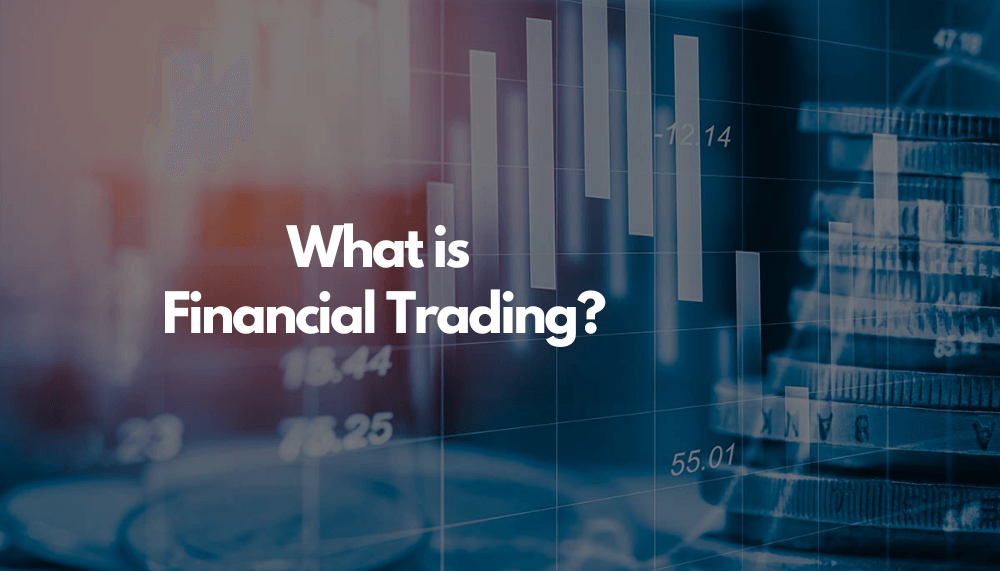Financial trading means buying and selling assets in financial markets where you can trade anything from stocks, commodities, and indices to foreign exchange, and more.
People who trade financial instruments often do it because they need the assets for themselves or their business. For example, you may be traveling from Europe to the USA and want to convert Dollars to Euros. For this, you would participate in the forex market.
Mostly, financial traders don’t need the assets at all. They make suppositions about the financial markets to make a profit from movements in the price, for example by buying low, and then selling high.
Types of Financial Instruments
Financial instruments are the objects/assets that are traded in the financial market during financial trading.
Different types of financial instruments are:
- Stocks: It means the shares in companies that change their value according to the company’s performance, financial prospects, and public opinion.
- Indices: These are the securities such as stocks and bonds that measure the performance of a specific market.
- Forex: Forex means the foreign currencies that are traded in pairs, like the EUR/GBP.
- Commodities: Commodities include precious metals, energy resources, agricultural products, and more.
- Cryptocurrencies: The digital currency in which transactions are verified and records maintained by a decentralized system. Crypto includes BitCoin, Ethereum, etc.
What is the Financial Market?
A financial market is the place where assets like stocks, indices, commodities, forex, and others take place. For example, the New York Stock Exchange (NYSE), and the Chicago Mercantile Exchange (CME).
Types of Financial Market
Apart from the stock market, numerous financial instruments can be traded, these instruments are classified into their respective markets based on varied parameters.
Various types of financial markets in which trading happens are:
1. Stocks
This is the common hub for companies to increase/raise their capital and public relations. They register their shares and issue them to interested traders via an initial public offering (IPO) in the secondary market.
2. Commodities
A commodity market deals with commodity markets, including assets like gold, oil, wheat, rice, etc. Globally, there are 50 major commodity markets. A trader may need aluminum and other metal components for the making of electronic devices in his factory.
3. Forex
The FX (Forex) market helps in conducting currency trade. The work of these markets is managed through financial institutions and is used to predict foreign exchange prices for every money. The FX market is not physical.
4. Derivatives
The derivatives are dealt with in the derivatives market, which obtain their worth from an underlying asset. These types of trades can be entered through either over-the-counter or exchange-traded derivatives to handle the financial risk.
Conclusion
In conclusion, financial trading is the process of purchasing and selling financial instruments. There are many types of financial assets, including shares, indices, forex, and commodities. Most of the time Financial Trading is done for profit and not because a trader is in want of an asset. Financial markets are the place where buyers and sellers come to trade. The markets have to be regulated to decrease fraud, keep transaction costs lower, and improve efficiency.
Frequently Asked Questions
Q. How do people access financial markets for trading?
A. Individuals generally engage with financial markets via brokerage firms or online trading platforms, which offer the essential tools and systems required for the purchase and sale of financial instruments.
Q. Is financial trading risky?
A. Yes, engaging in financial trading carries considerable risks. Factors such as market volatility, unforeseen circumstances, and the application of leverage can result in significant financial losses. It is essential to comprehend these risks and to trade only with funds that you are prepared to lose.
Q. What makes financial trading distinct if markets are just places where things are bought and sold?
A. Financial trading is distinct in that it typically does not involve tangible goods. You are exchanging rights or agreements related to future value. It resembles wagering on the prospective success or value of something intangible, such as a corporation’s potential or a nation’s economy.
Q. Is financial trading just for big companies? How do regular people get involved?
A. Yes, ordinary individuals can engage through regulated forex brokers or trading platforms. These platforms function as digital marketplaces, allowing users to buy and sell financial instruments with relatively modest sums of money.
Q. What’s the most important thing to understand before even thinking about financial trading?
A. The primary concern is the potential for financial loss. It is not a surefire method for acquiring wealth, as the value of assets can decrease just as readily as it can increase.

